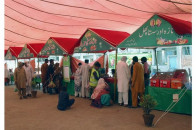World Thalassaemia Day: Dealing with defective genes and myths
There is dire need to identify and treat the disease: health expert.

The birth of her second child changed Shaista Bibi’s* life for the worse. Her husband divorced her upon finding out that their baby was a thalassaemia major like their elder son. However, she is not the only one to blame for the disease.
“My husband is also a thalassaemia minor and he’s equally responsible for this,” she said while talking to The Express Tribune here on the eve of the World Thalassaemia Day. “It was shocking for me as my husband did not support me and never told his mother that he was a carrier too,” she added.
The day is observed worldwide on May 8 to raise awareness on the disease, methods of prevention and treatment. In Pakistan, it is estimated that five out of 100 people are thalassaemia patients and around eight million carriers of the disease.
Raheela* feels helpless for her elder daughter Anee*, 28, who was diagnosed with thalassaemia minor three years back. This has become a hurdle in her way to getting married. “I’ve always tried to hide her genetic disorder from potential suitors,” said Raheela. On the other hand, Anee* does not see her disease as a social stigma, “I am an educated girl and don’t want my future children to suffer.
I cannot help speaking the truth, no matter what circumstances I have to face,” she said.
While talking to The Express Tribune, Thalassaemia Awareness and Prevention Programme in Pakistan President Ayesha Abid said that it is very unfortunate that many women suffer due to lack of awareness about this genetic disorder.
Pakistan Institute Medical Sciences (Pims) Children Hospital Assistant Professor Dr Naila Yaqub Pims said, it is important for the couple to be tested for thalassaemia before getting married. “There is a prenatal test called chorionic villus sampling which helps to test the baby for thalassaemia major. This helps the family decide whether to have the baby if diagnosed or to abort it. There is need to create awareness about it,” she stressed.
Currently 800 thalassaemia patients are registered at Pims Thalaassaemia Centre. Last year, 13 children were diagnosed of which 10 were aborted and one died, she said.
*Names have been changed to protect identity
Published in The Express Tribune, May 8th, 2012.



















COMMENTS
Comments are moderated and generally will be posted if they are on-topic and not abusive.
For more information, please see our Comments FAQ